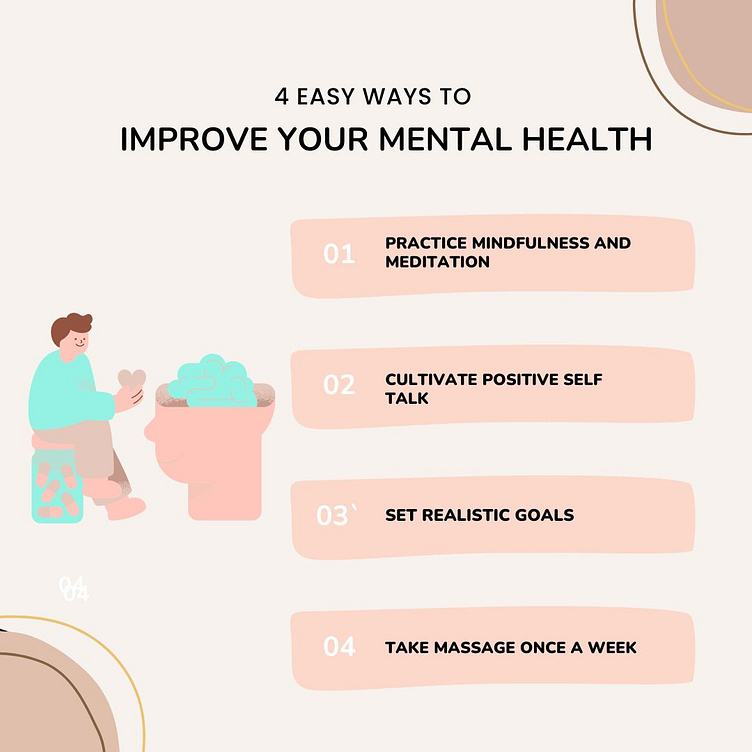5 Effective Ways To Foster Mental Health Acceptance In Your Community

Table of Contents
Raise Awareness Through Education and Open Dialogue
Open communication and education are cornerstones of improving mental health acceptance. By actively disseminating information and facilitating discussions, we can break down the barriers that prevent individuals from seeking help.
Community Workshops and Seminars
Organizing workshops and seminars is a powerful way to raise awareness about mental health issues. These events provide a platform for learning and dialogue.
- Invite mental health professionals to speak: Experts can provide accurate information and address common misconceptions.
- Use relatable stories and real-life examples: Sharing personal experiences (with consent) can create empathy and understanding.
- Provide resources and support information: Offer attendees a list of local resources, helplines, and support groups. This practical step connects theory to action.
Social Media Campaigns and Public Awareness Events
Leveraging the power of social media and organizing public events are essential for broad reach. These initiatives can amplify your message and encourage participation.
- Use compelling visuals and hashtags to maximize reach (#MentalHealthMatters, #MentalHealthAcceptance, #EndTheStigma): Visually engaging content grabs attention and expands your message's reach.
- Partner with local organizations and influencers: Collaboration amplifies your message and reaches diverse audiences.
- Highlight success stories and testimonials: Sharing positive stories showcases recovery and resilience, combating negative stereotypes.
Promote Accessible and Affordable Mental Healthcare
Ensuring access to quality mental healthcare is paramount for fostering mental health acceptance. This involves both advocacy and practical steps to connect individuals with existing resources.
Advocate for Increased Funding and Resources
Limited access to mental healthcare is a significant barrier. Advocating for change requires active participation in the political and social spheres.
- Contact local representatives and policymakers: Let your voice be heard and push for increased funding for mental health services.
- Support charities dedicated to mental health: Donations and volunteering contribute directly to expanding resources.
- Advocate for affordable insurance coverage: Affordable healthcare should include comprehensive mental health benefits.
Connect Individuals with Existing Resources
Creating a readily available directory of resources empowers individuals to seek help when needed.
- Publish the directory online and in print: Make information easily accessible to the widest possible audience.
- Regularly update the directory with new resources: Ensure the information remains current and relevant.
- Partner with local libraries and community centers for distribution: Maximize reach and ensure visibility within the community.
Challenge Stigma Through Storytelling and Personal Narratives
Stigma perpetuates silence and prevents individuals from seeking help. By sharing stories and promoting positive representations, we can dismantle harmful stereotypes.
Share Personal Stories Safely and Respectfully
Sharing personal experiences, when done responsibly, can be profoundly impactful.
- Organize storytelling events or workshops: Create a supportive environment for sharing experiences.
- Ensure anonymity and confidentiality are maintained: Prioritize the safety and comfort of those sharing their stories.
- Focus on resilience and recovery: Highlight hope and the possibility of healing.
Highlight Positive Representations in Media and Community Events
Positive portrayals are essential for countering harmful stereotypes.
- Work with local media outlets to create awareness campaigns: Reach a broader audience through media partnerships.
- Feature stories of individuals thriving with mental health conditions: Showcase success and resilience.
- Encourage diverse representation in these portrayals: Ensure the representation reflects the diversity of the community.
Create Supportive and Inclusive Community Spaces
Building supportive environments fosters a sense of belonging and encourages help-seeking behaviors. This involves establishing support groups and promoting well-being activities.
Establish Mental Health Support Groups
Support groups offer a safe space for sharing experiences and finding mutual support.
- Partner with local organizations and mental health professionals: Ensure groups are properly facilitated and supervised.
- Offer various group formats (online and in-person): Cater to diverse preferences and needs.
- Ensure groups are inclusive and welcoming to all: Create a non-judgmental and accepting space.
Promote Mental Wellness Activities
Activities that promote mental well-being contribute to a holistic approach to mental health acceptance.
- Partner with local businesses and organizations: Expand reach and accessibility.
- Make activities accessible and affordable: Ensure everyone can participate.
- Highlight the positive impact of these activities on mental health: Promote the benefits of these activities.
Train Community Leaders and Members on Mental Health First Aid
Equipping community members with the skills to recognize and respond to mental health crises is vital.
Mental Health First Aid Training Programs
Mental Health First Aid training empowers individuals to help those in need.
- Partner with local Mental Health First Aid organizations: Access accredited training programs.
- Offer regular training sessions: Ensure ongoing access to training.
- Promote the value of early intervention: Emphasize the importance of early identification and support.
Bystander Intervention Training
Bystander intervention training provides practical strategies to respond to mental health crises safely and effectively.
- Use role-playing and scenarios to make training effective: Practical application enhances learning.
- Emphasize the importance of safe and effective intervention strategies: Prioritize safety and responsible action.
- Offer resources for individuals to reach out for support: Provide clear pathways to assistance.
Conclusion
Fostering mental health acceptance in your community requires a multifaceted approach. By implementing these five strategies—raising awareness, promoting accessible healthcare, challenging stigma, creating supportive spaces, and training community members—you can significantly contribute to building a more inclusive and compassionate environment. Remember, every action, no matter how small, can make a difference in promoting mental health acceptance. Let's work together to create communities where everyone feels supported and understood in their mental health journey. Start fostering mental health acceptance in your community today!

Featured Posts
-
 The Closure Of Anchor Brewing Company What Happened
May 03, 2025
The Closure Of Anchor Brewing Company What Happened
May 03, 2025 -
 Fortnite Players Revolt Over Music Change
May 03, 2025
Fortnite Players Revolt Over Music Change
May 03, 2025 -
 Unlock Cody Rhodes And The Undertaker Fortnite Skins A Complete Guide
May 03, 2025
Unlock Cody Rhodes And The Undertaker Fortnite Skins A Complete Guide
May 03, 2025 -
 A Place In The Sun Making The Most Of Your Overseas Property Search
May 03, 2025
A Place In The Sun Making The Most Of Your Overseas Property Search
May 03, 2025 -
 Christina Aguileras New Look Is Photoshopping Ruining Her Image
May 03, 2025
Christina Aguileras New Look Is Photoshopping Ruining Her Image
May 03, 2025
